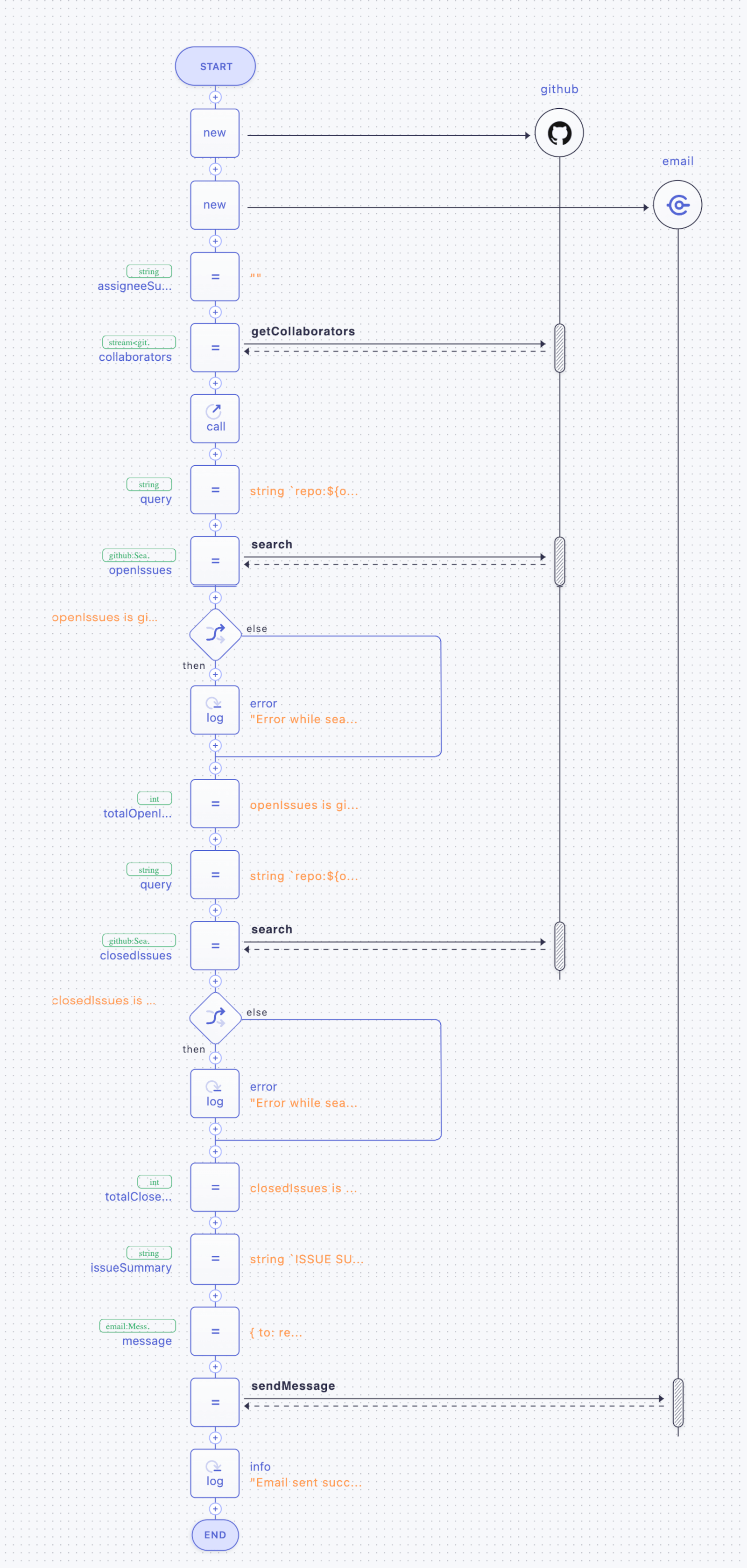Back to pre-built integrations
GitHub to email integration
By periodically sending GitHub issue summaries directly to email through seamless integration, team members can stay informed about the project's progress without the need to constantly visit the GitHub platform. This integration also ensures that crucial issue updates are never missed, enhancing responsiveness and facilitating prompt issue resolution.
The example below demonstrates how to get a GitHub issues summary as an email using Ballerina integration features.

import ballerina/email;
import ballerina/log;
import ballerinax/github;
// Github client configuration parameters
configurable string githubAccessToken = ?;
configurable string orgName = ?;
configurable string repoName = ?;
// Email client configuration parameters
configurable string smtpPassword = ?;
configurable string smtpUsername = ?;
configurable string smtpHost = ?;
// Email configuration parameters
configurable string recipientAddress = ?;
configurable string fromAddress = ?;
public function main() returns error? {
github:Client github = check new ({
auth: {
token: githubAccessToken
}
});
email:SmtpClient email = check new (host = smtpHost, username = smtpUsername, password = smtpPassword);
//Get collaborator list
string assigneeSummary = "";
stream<github:User, github:Error?> collaborators = check github->getCollaborators(orgName, repoName);
check collaborators.forEach(function(github:User user) {
string query = string `repo:${orgName}/${repoName} is:issue assignee:${user.login}`;
github:SearchResult|github:Error issuesForAssignee = github->search(query, github:SEARCH_TYPE_ISSUE, 1);
if issuesForAssignee is github:SearchResult {
string userName = user?.name ?: "Unknown";
assigneeSummary += string `${userName} : ${issuesForAssignee.issueCount} ${"\n"}`;
} else {
log:printError("Error while searching issues of an assignee.", 'error = issuesForAssignee);
}
});
//Get open issues
string query = string `repo:${orgName}/${repoName} is:issue is:open`;
github:SearchResult|github:Error openIssues = github->search(query, github:SEARCH_TYPE_ISSUE, 1);
if openIssues is github:Error {
log:printError("Error while searching open issues.", 'error = openIssues);
}
int totalOpenIssueCount = openIssues is github:SearchResult ? openIssues.issueCount : 0;
//Get closed issues
query = string `repo:${orgName}/${repoName} is:issue is:closed`;
github:SearchResult|github:Error closedIssues = github->search(query, github:SEARCH_TYPE_ISSUE, 1);
if closedIssues is github:Error {
log:printError("Error while searching closed issues.", 'error = closedIssues);
}
int totalClosedIssueCount = closedIssues is github:SearchResult ? closedIssues.issueCount : 0;
//Send email
string issueSummary = string `ISSUE SUMMARY REPORT${"\n\n"}Repository Name: ${repoName}
${"\n"}Total Issues Open: ${totalOpenIssueCount} ${"\n"}Total Issues Closed: ${totalClosedIssueCount}
${"\n\n"}Issue Count by Assignee: ${"\n"}${assigneeSummary} ${"\n"}`;
email:Message message = {
to: recipientAddress,
'from: fromAddress,
subject: "Git Issue Summary",
body: issueSummary
};
check email->sendMessage(message);
log:printInfo("Email sent successfully!");
}